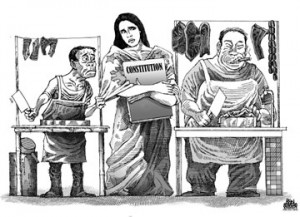
With the current Palace occupant saying that Charter change is not a priority in his administration, lawmakers across the country are targeting instead the economic provisions of the Constitution, particularly on expanding the ownership of foreign investors in key industries like mining.
As is the case, the usual opponents to liberalizing or opening the economy to the foreign investors are the militant groups, nongovernment organizations and the students who push for nationalization of industries instead.
Big business and entrepreneurs, in contrast, welcomed the proposal, saying this will result in bigger infusion of capital from foreign companies specially in the fields of mining, information technology and so on.
In studying the pros and cons of further liberalizing the economy, one can perhaps take into consideration a Yahoo! Finance news story that stated more Chinese billionaires are investing their capital and resources overseas, particularly in the US owing to the stringent provisions imposed by the Chinese government.
One such provision mandates that whatever property owned by a person will be turned over to the state 70 years after their acquisition. Also, owing to that country’s communist ideology, the Chinese wealthy cannot speak out against the government and they are prohibited from having a second child, on pain of paying the state US $40,000 if they do so.
While the US is a major beneficiary along with other European countries, one can only imagine how the Americans would feel, seeing some of their own lands and companies being acquired by the rich Chinese.
There were certainly a mixture of resentment and relief when the Japanese began buying up US companies left and right, including major film studios at the height of its economic progress, only for the Asian giant to experience a decline due to a series of debacles notable among them this year’s earthquake.
The same situation confronts the Philippines, which has yet to climb out of its third world quagmire and yet being persuaded by some of its entrepreneurs to open its doors to investors who may or may not invest their returns to the country but instead ship their earnings back home.
While the country’s Constitution needs to be updated in keeping with the shifting sands of the global economic market, it should remain the vanguard for keeping control of the country’s precious resources and manpower to the country’s constituents.